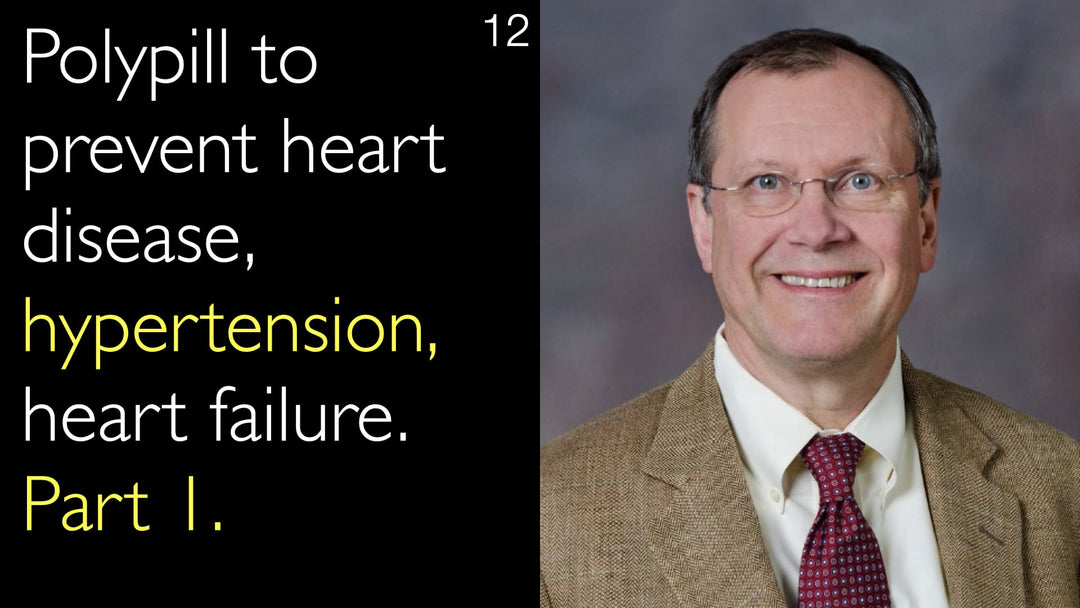Diuretics, Hydrochlorothiazide, indapamide form part of the polypill. Polypill is especially adopted in countries outside of the West, countries such as Iran, Pakistan. Polypill apparently resulted in 50% effect to decrease cardiovascular events. What do you think of the polypill approach to reduce the risks of cardiovascular disease and population? Yeah, I actually love the idea. And I sort of mentioned this before, and I want to come back to diuretics specifically about the polypill. But the idea is what we talked about before. If you give small doses of a variety of medications that have benefits on their own, you could maybe have a lower rate of side effects or maybe no side effects and have dramatic benefits. Dr. David Ellison, MD.: And so typically the polypill will have a statin and maybe some polypill used to have aspirin in it, and a little bit of an ACE inhibitor or Angiotensin Receptor Blocker, and then a little bit of a thiazide diuretic. All these drugs that we know to improve outcomes in patients when drugs are used to full doses. But one of the problems with using any of these classes of drugs, is that it elicits a physiologic counter-response that can be adverse. So, you may give a diuretic that stimulates the renin - angiotensin aldosterone system. We talked about the fact that angiotensin and aldosterone can be bad actors, they can hurt you. Dr. David Ellison, MD.: And so, you think that by stimulating the renin angiotensin - aldosterone system that might have adverse effects. Well, we think that the benefits outweigh the risks when you give a thiazide diuretic. Conversely, when you inhibit the renin - angiotensin system and lower blood pressure, you can sometimes tend to accumulate fluid, and that's a bad thing. So, in theory, if you block multiple points along the pathway, you might be able to get all the good effects without the bad. By using very low doses, you are likely to avoid most of the side effects. I actually am very enthusiastic about polypill. I think that the data about the polypill is very exciting. Whether this should be given broadly to people in other countries like the United States or in Europe, at this point, there's not enough enthusiasm for doing that. But I think it's been more inertia than it's been based on scientific data. And if I could counsel people that I know, if it were available in this country, I might suggest they do it. We come back to diuretics for a second. I believe the same phenomenon is true in terms of diuretics. I mentioned the fact that acute decompensated heart failure, or patients who come in with multiple hospitalizations for heart failure, is a big problem for the country [USA]. It's one of the most common causes of hospitalization in the United States, it costs billions of dollars, and patients are really miserable when they have these heart failure decompensation episodes. What can we do to make that less likely? What we do when patients come in right now is we give them super high doses of loop diuretics, because we have to do it. It's the only way to get heart failure patients to diurese. But we now understand, this is partly from work in our own laboratory, what giving a diuretic does to the kidney to cause it to compensate. And when you give a high dose of a loop diuretic chronically, the other parts of the kidney compensate by becoming hypertrophic. Dr. David Ellison, MD.: And so, you have hypertrophy of the other parts of the nephron when you block transport in one segment. And we believe that one of the reasons that we have to have these patients with these recurrent episodes, and the loop diuretics lose their effectiveness, is because the hypertrophic segments of the nephron that are not being blocked, overcome the actions of the loop diuretics. So probably the right time to deal with this is not when patients come into the hospital with an acute heart failure decompensation, but before they decompensate. I believe, and we are studying this right now in the laboratory. We hope to translate this to the clinic. Instead of giving a very high dose of a loop diuretic, you gave a very small dose of a drug that blocks transport in the proximal tubule, blocks transport in the loop of Henle, blocks transport in the distal convoluted tubule, and blocks the transport in the collecting duct. Then you would have an effective approach to diuretics that wouldn't lead to the compensatory mechanisms that become your enemy rather than your friend. So, we're testing essentially a diuretic polypill to see if we can prevent the compensatory changes in the kidney that ended up leading to patients with [acute heart failure] coming into the hospital. We don't know the answer yet. But we are well on our way to looking at that. I do believe that that kind of approach, a diuretic polypill approach makes a lot of sense. I would add that we now know that these drugs, these SGLT2 inhibitors, which are diuretic, they do increase your sodium excretion, although they also help treat diabetes. But they are almost miraculously can treat heart failure with reduced ejection fraction, they can treat chronic kidney disease, they can reduce the risks of many diseases. And really, this is the first class of drugs that has shown the ability to be able to treat heart failure with preserved ejection fraction. Dr. David Ellison, MD.: And so, these are really outstanding drugs. Dr. David Ellison, MD.: And so instead of using a typical diuretic in the proximal tubule, what we are also investigating is using an SGLT2 inhibitor in the proximal tubule with the same goal, in very small doses, but trying to prevent the decompensation, in order to keep people healthier for longer.
Mehr von DiagnosticDetectives.Com




